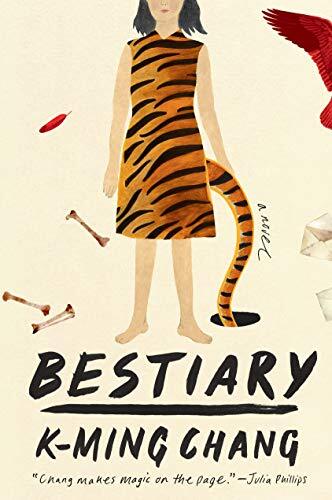A Review of K-Ming Chang’s Bestiary (One World, 2020)
Posted by:
![[personal profile]](https://i.gr-assets.com/images/S/compressed.photo.goodreads.com/hostedimages/1491408111i/22407843.png) ljiang28
ljiang28
Written by Stephen Hong Sohn
Edited by Lina Jiang

K-Ming Chang’s Bestiary was a novel I saved to read during my writing retreat. What can I say, this novel is funktastic, with a lot of transformations and experimental approaches. Let’s provide you with some background via the official marketing description: “One evening, Mother tells Daughter a story about a tiger spirit who lived in a woman’s body. She was called Hu Gu Po, and she hungered to eat children, especially their toes. Soon afterward, Daughter awakes with a tiger tail. And more mysterious events follow: Holes in the backyard spit up letters penned by her grandmother; a visiting aunt arrives with snakes in her belly; a brother tests the possibility of flight. All the while, Daughter is falling for Ben, a neighborhood girl with strange powers of her own. As the two young lovers translate the grandmother’s letters, Daughter begins to understand that each woman in her family embodies a myth—and that she will have to bring her family’s secrets to light in order to change their destiny. With a poetic voice of crackling electricity, K-Ming Chang is an explosive young writer who combines the wit and fabulism of Helen Oyeyemi with the subversive storytelling of Maxine Hong Kingston. Tracing one family’s history from Taiwan to America, from Arkansas to California, Bestiary is a novel of migration, queer lineages, and girlhood.”
I didn’t manage to read anything about the novel prior to getting started on it; I even avoided the book jacket description, so as soon as we get to the point where the protagonist, Daughter, wakes up with the aforementioned tiger’s tail, I was wondering whether or not this transformation was more metaphorical or not. Chang seems to want it both ways, which makes this novel quite slippery and potentially confusing to readers, but it’s an absolute delight in terms of its linguistic wordplay and its dynamic use of transformations (both literal and figurative). The sections provided by Daughter are sometimes interspersed with letters that Daughter and her friend (and later lover) Ben (noting here that Ben is gendered female despite what some might assume is a male name) are translating. The sections from Grandmother read like poetry, which bring to mind Chang’s background as a poet. Indeed, we might actually read this novel as a kind of prose poem. Chang’s work also conjures up the work of Jenny Zhang. Zhang’s short stories in Sour Heart really delve into some of the challenges of immigrant poverty, and we’re absolutely in that terrain here. Chang’s work reminds us of the spirit of survival that is necessary for so many immigrants. A wonderfully inventive debut.
Buy the Book Here
 comments
comments
![[personal profile]](https://i.gr-assets.com/images/S/compressed.photo.goodreads.com/hostedimages/1491408111i/22407843.png) ljiang28
ljiang28
Written by Stephen Hong Sohn
Edited by Lina Jiang

K-Ming Chang’s Bestiary was a novel I saved to read during my writing retreat. What can I say, this novel is funktastic, with a lot of transformations and experimental approaches. Let’s provide you with some background via the official marketing description: “One evening, Mother tells Daughter a story about a tiger spirit who lived in a woman’s body. She was called Hu Gu Po, and she hungered to eat children, especially their toes. Soon afterward, Daughter awakes with a tiger tail. And more mysterious events follow: Holes in the backyard spit up letters penned by her grandmother; a visiting aunt arrives with snakes in her belly; a brother tests the possibility of flight. All the while, Daughter is falling for Ben, a neighborhood girl with strange powers of her own. As the two young lovers translate the grandmother’s letters, Daughter begins to understand that each woman in her family embodies a myth—and that she will have to bring her family’s secrets to light in order to change their destiny. With a poetic voice of crackling electricity, K-Ming Chang is an explosive young writer who combines the wit and fabulism of Helen Oyeyemi with the subversive storytelling of Maxine Hong Kingston. Tracing one family’s history from Taiwan to America, from Arkansas to California, Bestiary is a novel of migration, queer lineages, and girlhood.”
I didn’t manage to read anything about the novel prior to getting started on it; I even avoided the book jacket description, so as soon as we get to the point where the protagonist, Daughter, wakes up with the aforementioned tiger’s tail, I was wondering whether or not this transformation was more metaphorical or not. Chang seems to want it both ways, which makes this novel quite slippery and potentially confusing to readers, but it’s an absolute delight in terms of its linguistic wordplay and its dynamic use of transformations (both literal and figurative). The sections provided by Daughter are sometimes interspersed with letters that Daughter and her friend (and later lover) Ben (noting here that Ben is gendered female despite what some might assume is a male name) are translating. The sections from Grandmother read like poetry, which bring to mind Chang’s background as a poet. Indeed, we might actually read this novel as a kind of prose poem. Chang’s work also conjures up the work of Jenny Zhang. Zhang’s short stories in Sour Heart really delve into some of the challenges of immigrant poverty, and we’re absolutely in that terrain here. Chang’s work reminds us of the spirit of survival that is necessary for so many immigrants. A wonderfully inventive debut.
Buy the Book Here
 comments
comments
Published on April 06, 2022 13:23
No comments have been added yet.



